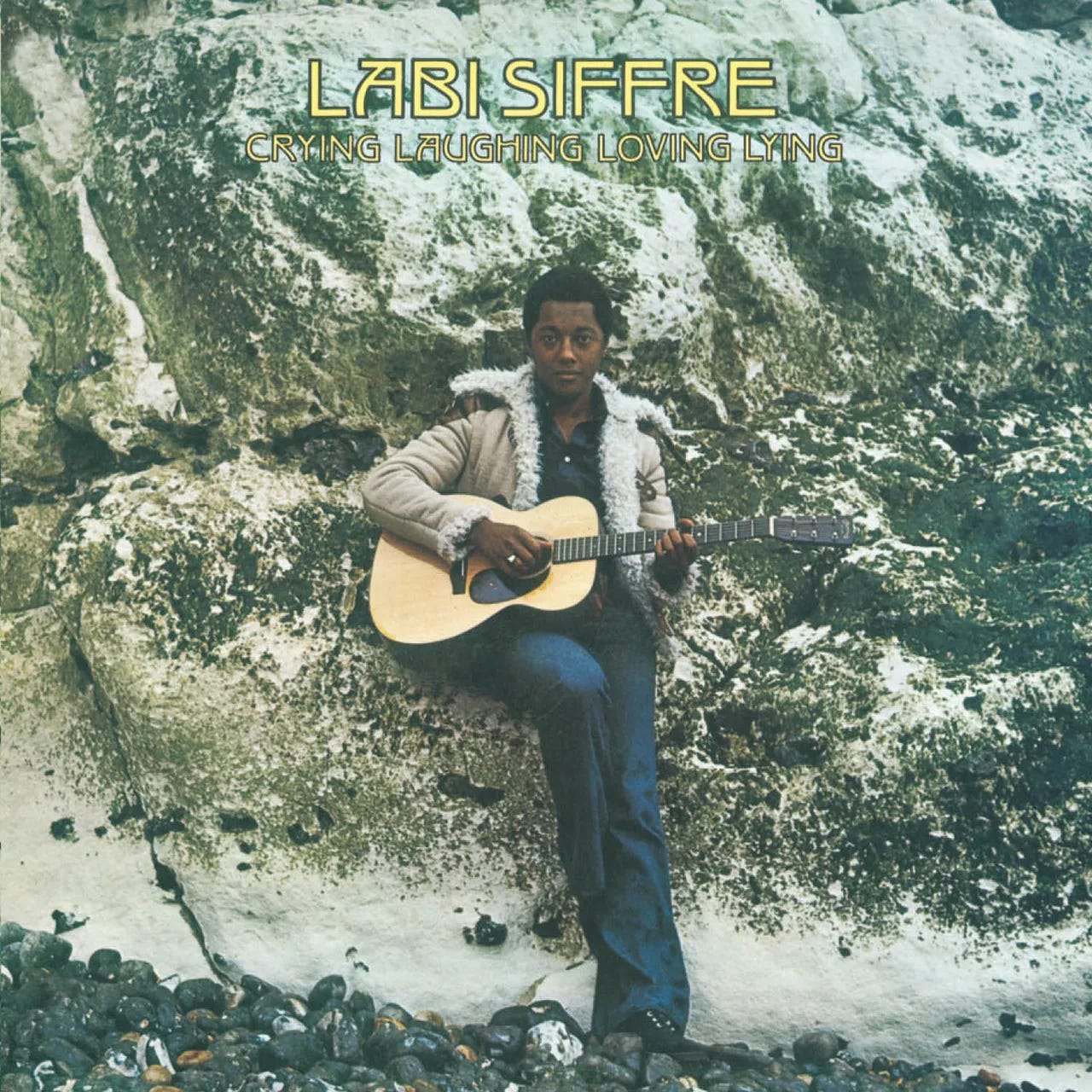In 1972, singer-songwriter Labi Siffre released his third studio album Crying Laughing Loving Lying, with hit songs ‘It Must Be Love’ and ‘My Song’ on the record. This, more or less, underground album delves into themes of identity, love, and the beauty of nature. Here are some words on Crying Laughing Loving Lying.
The album begins with the acapella ‘Saved’, which sets up Siffre’s adamant political beliefs with the strident “I am a free man, and my father, he was a slave”. As noted in a BBC 1972 interview, Siffre wished for the audience “to not know who I was, and not to see me”; instead placing his music and poetry in the limelight. Siffre’s choice to begin the record with only his vocals lays Crying Laughing Loving Lying out as a frank declaration of human experience. From the beginning, the singer-songwriter drives the listener to intimately engage with his lyricism.
‘Cannock Chase’ (track 2) is a gorgeous piece of music, with Siffre fingerpicking on acoustic guitar; its rhythm mirroring that of the “rain” that “falls from the roof of the world”. Siffre takes the beauty of nature and finds solace in it - escaping “the blues” which attempt to consume him:
“I've been down for oh so long
It seemed like my soul was dead and gone
But it's alright, I'm back in the fight”
There are notes of hope in ‘Cannock Chase’. The “bird in a tree” and “trees and the ground” serve to aid Siffre’s soul which he had previously believed was “dead and gone”. The strings shift from staccato to legato as they accompany the singer’s words.
‘It Must Be Love’ was famously covered by ska-pop band Madness in 1981, reaching #4 on the UK singles charts - Siffre had a cameo in the music video as a violin player. Siffre’s original version is charming, with fleeting double-tracked harmonies and an unpretentious acoustic guitar solo. For most, it is the musicians who covered/sampled Siffre’s work that introduced him to his fans. This is additionally evident through ‘My Song’, famously sampled by controversial American rapper Kanye West in his 2007 song ‘I Wonder’ on Graduation. The original ‘My Song’ is a beautiful piano ballad, with Siffre presenting forward his self-acceptance. Living proudly out as a gay man at this time, Siffre undeniably had to deal with the homophobic rhetoric of the 1970s - ‘My Song’ asserts his identity proudly.
Tracks like ‘Gimme Some More’ and ‘Love Oh Love Oh Love’ both focus on the consuming feeling of love against a peppy rhythm. ‘Gimme Some More’s catchy guitar introduction sets up a lively atmosphere that does not falter, with Siffre demanding for “more” of this “beautiful day”. ‘Love Oh Love Oh Love’ begins slower before transitioning into its buoyant beat. A variety of instruments play big roles on this song - from organ, to lively guitar segments, to a meticulous drumming backdrop. Track 6 is ‘Blue Lady’ - a spectral song, with echoing acoustic guitar accompanying elegant vocals. The drum part is impressively radical at times, adding progressive elements to Crying Laughing Loving Lying.
The album’s title-track is structurally simple, yet deeply profound. Again, the use of double-tracked harmonies create a mellifluous atmosphere which brings forward the record’s common themes of nature and life. The narrator insists that he does not “cry”, and instead “laugh[s]” because he does not “love” one he used to, before revealing that in fact he has been “lying” this whole time. Through this song and, by title, the album itself, Siffre gives the listener a first-hand experience of lost love - something that is, more often than not, a colossal cause of sorrow in the human experience.
‘Hotel Room’ and ‘Come on Michael’ are the two final songs on Crying Laughing Loving Lying I’d like to discuss. Where the former is gracefully human and humorous in Siffre’s lyricism, “Breakfast on a plastic tray, Birmingham is very grey”, the latter is profoundly sentimental. ‘Hotel Room’ was written the morning after a, as Siffre notes, “rotten” performance. Siffre refuses to label himself as the ‘popstar’ figure in this song, instead asserting himself and the album as ordinary and relatable: “sitting in a hotel room, have to start work soon”.
‘Come on Michael’, on the other hand, shifts from a jaunty rhythm as the singer tells the tale of his “friend called Michael” who needs to “push a little harder”, before slowing down on the line: “It’s just not the same without you”. Here, Siffre maintains the importance of self-strength and motivating those around you to feel confident in themselves. Siffre’s vocals overlap eachother with the line “do you understand?” into a harmonious chaos, alongside an organ segment. Masterfully, the singer-songwriter transforms ‘Come on Michael’ from a silly motivational tune, to a musical wall of self-confidence.
Crying Laughing Loving Lying is a folk-soul gem that deserves much more attention that it is currently receiving. It is raw, spirited, and organic - things that the music industry doesn’t produce a whole lot of nowadays. On this brilliant record, Labi Siffre puts poetry to music.









He may be forever remembered for ‘I Got The…,’ which Eminem famously sampled.